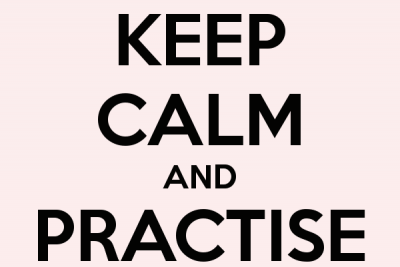Hello there! I am not in the hope of finding you to be doing very well in terms of health and the general state of the mind. It’s November and you’re just a month away from most of your MBA entrance exams. So at this juncture, it felt like it was our duty to have a communication from the other end as the last mile connectivity before D-Day. I have here laid down 5 key areas to focus before attempting the IIFT exam.
The ‘I’ here is Mr. Tanmaiy Gnanadev, a First Year student at IIFT Kolkata. He shares his thoughts on some of the important things that you cannot miss before the test.
Profile:
Name: Tanmaiy Gnanadev
Qualification: B.Tech (Chemical Engineering) – IIT Madras
Work-Ex: Reliance-12 Months (Gujarat)
IIFT Score: 99.62 Percentile
Vocab
[caption id="" align="aligncenter" width="400"] You cannot take Vocab for granted[/caption]
You cannot take Vocab for granted[/caption]
It’s a very common sight to see coaching centers organize classes exclusively for building vocabulary. And I wouldn’t blame them, as it pays to have a great vocabulary prowess. While Word Power Made Easy appears as an easy option, after a certain point of time, it becomes mundane and just to crack an exam, the task looks like too much effort, too less output.
Rather what’s required of aspirants is to read the paper and try and pick up a novel written in the 19th and 20th century. It helps far more than just vocabulary. You learn different happenings around you and also the history of many countries and their cultures.
But with 20 days in the kitty, you cannot afford to do this. So, just go through the past papers and pick up some words. Also, glance through some frequently used foreign phrases which could come in handy.
GK
[caption id="" align="aligncenter" width="389"] Quickly recap the past 5-6 months newsletters[/caption]
Quickly recap the past 5-6 months newsletters[/caption]
Now IIFT exam is nefarious for its association with the GK section. Most of the years, the GK cut off hasn’t crossed 5, indicative of its toughness. Now again, no one can really prepare you for GK, but the experience of writing the exam tells me that, reading the paper everyday would’ve been most helpful. You cannot ignore the Static GK part as well.
At this stage, though, the focus has to be on reviewing the news from the past 6 months. TIME brings out monthly newsletters. Try and get hold of it from your friends. They publish good articles. But the biggest learning point has to be going through the previous questions from old papers. Focus is mostly the biggest events in Politics of India, Schemes launched and Sports achievements.
2016 Olympic winners, for example!
Calculators, lack thereof
[caption id="" align="aligncenter" width="400"] Allocate some time for Speed Math[/caption]
Allocate some time for Speed Math[/caption]
Yes, you guessed it. IIFT does not allow any calculators, unlike CAT. Then again it is an offline exam. So the benefits outweigh heavily. Anyway, as aspirant’s practicing the CAT exam like the GaoKao of China, you must be already aware of shortcuts to add, multiply, divide etc., so the same goes here. Certain questions involving data interpretation involve the application of this. This section is likely going to be extremely calculation-intensive. Take it up, if you must.
Unless you belong to that class of students who knows the 14.5th percentile of a normal distribution with mean 50 at his/her fingertips, it is generally understood that such problems are to be left untouched for the greater souls taking the exam. You can still make the cut with the other sections. Quant will be fairly easy and should be your bulk for clearing the cut-off.
So don’t worry about the calculator part. Just know your basics like squares, tables till 20, ratios till 20 and all and you can be assured of a good score. Come on! Go back to the basics and memorize them all.
Practice, Practice and more Practice
[caption id="" align="aligncenter" width="400"] Eat...Sleep...Mock Test...Repeat![/caption]
Eat...Sleep...Mock Test...Repeat![/caption]
They say exams like CAT, IIFT and XAT are not much about how you prepare. It has more to do with how accustomed you are to the pattern of each paper before appearing for the exam. IIFT papers of previous few years are available online. Print them and start practicing. Solving a couple of them with a time limit of the actual exam might sound taxing, but trust me, it will help like no other preparation.
So while you while away 2 hours watching the new season 7 of you-know-what, spend that time in solving that old paper. And it doesn’t end there, it’s the analysis that counts. Check where have you gone wrong and where you went too conservative. This will help beyond doubt in strengthening your weaknesses.
Does this even end? I mean the RC
[caption id="" align="aligncenter" width="407"] You cannot afford to react like this during the test[/caption]
You cannot afford to react like this during the test[/caption]
This is the usual lament we all have during the mocks. Usually, we try to keep English to the last, just to chill after some heavy maths and calculations, only to find 2-page RCs. Well, that’s the thing these days. GET USED TO IT.
Reading speed is the only key. The faster you read, the more the chances that you’ll remember the entire tone of the passage, once you’re done reading. Contrary to popular perception, slow reading of RCs will not help in any manner. You have to get to the underbelly of the matter in contention within the first perusal of the passage. Questions will be simple to answer. Few involve just CTRL+C and CTRL+V from the passage. But do look out for traps. A reading speed of 500 words per minute can be achieved with 1 week of practice. On the day of the exam, try to read the entire editorial of any English paper within 2 minutes. That’ll set you up for the day. Just keep your senses sharp for 2 hours, try and answer as many as possible. Many questions might be lifted, especially GK. Approach confidently.
So I feel if you work on these 5 areas, you can surely hope for a decent score and a call perhaps. Remember, the game isn’t over till the fat lady sings. So it all boils down to your day of the exam. All the best. Hope to see you on campus!
